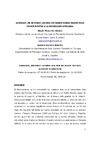Identificador persistente para citar o vincular este elemento:
https://accedacris.ulpgc.es/jspui/handle/10553/72832
| Título: | "Harraga", de Antonio Lozano: un negro sobre negro para poner rostro a la migración africana | Otros títulos: | "Harraga", of Antonio Lozano: a black on black to face african migration | Autores/as: | Pérez Hernández, Nayra Becerra Bolaños, Antonio |
Clasificación UNESCO: | 5403 Geografía humana | Palabras clave: | Literatura de la migración Noir Migración africana Literatura española Literatura canaria, et al. |
Fecha de publicación: | 2020 | Editor/a: | Universidad de Murcia | Publicación seriada: | Tonos Digital | Resumen: | El Mediterráneo se ha convertido en nuestros días en el cemen terio más grande del Planeta. Miles de personas de África y el Medio Oriente huyen de la guerra, el expolio, el hambre, en el éxodo más grande de la historia. Unos pocos llegan a Europa, tras una verdadera odisea, y, una vez allí, son condenado s a existir en la ilegalidad.
Esta problemática, que empieza a aparecer en las letras españolas desde finales de la década de los 80 del siglo XX, ha sido retratada en varias ocasiones en la narrativa de Antonio Lozano (Tánger, Marruecos 1956 - Las Palmas de Gran Canar ia, España, 2019), quien fue un profundo conocedor de la novela africana, desde su actividad como traductor literario. Nuestro objetivo es acercarnos a Harraga (2002), la primera de las novelas de este autor en la que se acerca, desde el género noir - que s e africaniza - , a la problemática de la inmigración irregular África - Europa, para que estas personas tengan nombre, voz y rostro. Analizaremos en la novela los distintos momentos de ese viaje: la salida; el propio viaje, con sus peripecias; la experiencia e xiliar y la construcción de la memoria de los que se fueron; para terminar planteándonos si podemos hablar de Antonio Lozano como de un autor africano. The Mediterranean has nowadays become the largest cemetery on the planet. Thousands of people from Africa and the Middle East flee from war, plunder, hunger, in the greatest exodus in history. A few arrive in Europe, after a true odyssey, and, once there, they are condemned to exist in illegality. This problem, which begins to appear in Spanish letters since the late 80s of the twentieth century, has been repeatedly portrayed in the narrative of Antonio Lozano (Tangier, Morocco 1956 - Las Pa lmas de Gran Canaria, Spain, 2019), who was a deep connoisseur of the African novel, from his activity as a literary translator. Our goal is to approach Harraga (2002), the first of this author's novels in which he approaches, from the genus Noir - which is Africanized - , to the problem of irregular immigration Africa - Europe, so that these people have Name, voice and face. We will analyze in the novel the different moments of that trip: the departure; the trip itself, with its adventures; the exile experience and the construction of the memory of those who left; Finally, we wonder if we can talk about Antonio Lozano as an African author. |
URI: | https://accedacris.ulpgc.es/handle/10553/72832 | ISSN: | 1577-6921 | Fuente: | Tonos digital [ISSN 1577-6921], n. 38 | URL: | http://dialnet.unirioja.es/servlet/articulo?codigo=7247932 |
| Colección: | Artículos |
Visitas 10
325
actualizado el 16-ene-2026
Descargas
302
actualizado el 16-ene-2026
Google ScholarTM
Verifica
Comparte
Exporta metadatos
Los elementos en ULPGC accedaCRIS están protegidos por derechos de autor con todos los derechos reservados, a menos que se indique lo contrario.
